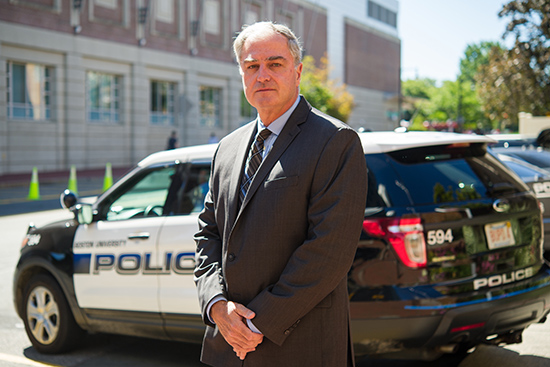BUPD Chief Tom Robbins Steps Down
Time to move on after 10 years of progress

Tom Robbins, BU Police Department chief and executive director of public safety, leaves his post today, September 16. Photo by Cydney Scott
Sitting in his office on the second floor of the BU Police Department, Tom Robbins recalls a quote that sums up his idea of how the police force should work within a community. “The police are the people, and the people are the police,” says the University’s police chief and executive director of public safety.
Robbins, who has led the BUPD for the past 10 years, steps down today, leaving a great deal of progress in his wake. Robbins helped guide the BU community through the Boston Marathon bombings, has overseen security for BU’s National Emerging Infectious Diseases Laboratories, and pushed the 40-member BUPD force through state and national accreditation. The chief says he is particularly proud of the steps the department has taken to engage with a community of more than 33,000 students and nearly 10,000 faculty and staff. Those steps include Bike Safety week, Cup O’Coffee with the Cops, and open forums that invite the community to bring their concerns to the department.
“I came to BU in 2006 and committed to this department to do a turnaround,” Robbins says. “The focal point of the last 10 years was to make sure we had the best and the brightest and that we were growing as a department as well as within the community. This job is certainly not one that can be done on autopilot, because this community is very dynamic and changing, and sometimes it throws curveballs at you that you have to hit.”
Robbins, a 37-year police veteran, previously was a colonel and superintendent of the Massachusetts State Police and was appointed director of aviation security at Logan International Airport following the September 11 terrorist attacks. Next up, he says, is spending more time with his family and a consulting role with a private company.
BU will begin an search to find a replacement, working with the Police Executive Research Forum, which the University used to find Robbins 10 years ago. In the interim, Scott Paré, BU’s deputy director of public safety and BUPD deputy police chief, will be acting chief.
Peter Fiedler (COM’77), vice president for administrative services, says Robbins’ departure is a great loss for the University, as the chief has reshaped the department into one of the best trained and most highly respected university police departments in the country. “Chief Robbins will be greatly missed at Boston University. Not only has he professionalized and elevated policing and public safety, Tom has also established a very personal and collaborative relationship with the faculty, staff, and students,” Fiedler says. “His successor will have big shoes to fill; however, Tom is leaving a department that can be very proud of the essential role it plays at Boston University. Personally, I will miss Tom’s positive spirit and great sense of humor. I greatly appreciate all he’s done for BU and his unwavering dedication and friendship.”
Brookline Police Chief Daniel O’Leary says that Robbins has done great things for not only BU students and families, but also for the Brookline Police Department. “Through his tenure, our two departments worked together on crime investigations and community events and did a lot of training together,” O’Leary says. “Tom has been great to deal with, whether it was during the Boston Marathon bombings, going out on Comm Ave giving away helmets, or investigating crimes. We have all benefited from his work.”
Robbins says he is especially proud of the department’s first state accreditation, in 2011, and its national honor in 2013 from the Commission on Accreditation for Law Enforcement Agencies (CALEA). Accreditation requires that a police force meet 482 standards, including officer training, crime analysis, and sound financial management. There are more than 700 national and international police forces that are recognized by CALEA, but only 2 Massachusetts colleges are among this group—BU and the University of Massachusetts Amherst.
The most significant event of his tenure, Robbins says, is clearly the 2013 Boston Marathon bombings, when the BUPD helped spectators and runners find safety along the route in Brookline. BU officers also assisted police from numerous departments in an all-night, house-to-house manhunt for bomber Dzhokhar Tsarnaev. “It was a moment that demonstrates how well trained our officers are,” he says.
One lesson learned from the Marathon bombings, says Robbins, is the power of social media, for both good and ill. “When an event happens, Twitter lights up,” he says. “The downside is you get a lot of false information, and people tweet things that may not be true. We now push people towards the BUPD or Boston Police Twitter accounts and the BU Today website to get actual, correct information. You want to make sure you get the information in a timely manner, but that you get it right and that the messaging is such that people can take the information and act upon it.”
Robbins acknowledges that some police forces have a difficult relationships with the communities they serve, and he appreciates that the BU community understands that police and the community are on the same side. “It should never be that the police are in a closet, and then when a crisis happens, open the closet and let them out to handle the crisis,” he says. “That’s the exact opposite of how you want to run a police department. You want to make sure that people understand that you are part of the community.”
Comments & Discussion
Boston University moderates comments to facilitate an informed, substantive, civil conversation. Abusive, profane, self-promotional, misleading, incoherent or off-topic comments will be rejected. Moderators are staffed during regular business hours (EST) and can only accept comments written in English. Statistics or facts must include a citation or a link to the citation.